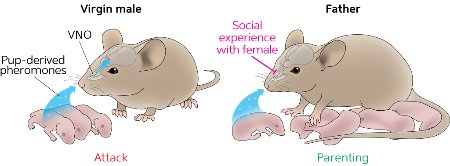Jun. 7, 2013 Research Highlight Biology
The parenting switch
Activation of a nose-to-brain neural circuit controls whether male mice attack or care for pups
 Figure 1: Pup-derived pheromones activate the vomeronasal neural pathway in virgin males, leading to aggressive behavior toward pups. The same neural pathway is suppressed in fathers, resulting in parental behavior. © 2013 Kashiko Tachikawa, RIKEN Brain Science Institute
Figure 1: Pup-derived pheromones activate the vomeronasal neural pathway in virgin males, leading to aggressive behavior toward pups. The same neural pathway is suppressed in fathers, resulting in parental behavior. © 2013 Kashiko Tachikawa, RIKEN Brain Science Institute
The transition from one life stage to another leads to behavioral changes in many species, including humans. In mice, virgin males display aggression towards pups but after mating show parental behaviors, even towards pups that are not their own offspring. Kashiko Tachikawa, Yoshihiro Yoshihara and Kumi Kuroda from the RIKEN Brain Science Institute have now identified a particular brain circuit that is activated in virgin males by the presence of pups to trigger aggressive behavior, and suppressed in fathers to induce parental behavior1.
Aggression by virgin male mice towards pups is thought to be an adaptive reproductive response aimed at enhancing their chances to reproduce with the pups’ mothers—without pups to care for, females cease lactating and restart ovulation. Adult mice sense pups by the pheromones they release, which activate vomeronasal sensory neurons (VSNs) within the vomeronasal organ (VNO) in the nose. The VSNs send information through a brain circuit that eventually leads to the hypothalamus to mediate behavioral responses to the pheromones. This vomeronasal neural pathway controls many social behaviors in mice, but until now its role in behavioral transitions has remained unclear.
The researchers found that sexually naive males displayed markedly stronger activation of neurons along the vomeronasal neural pathway after pup exposure compared with mouse fathers. Even the VSNs themselves within the VNO of fathers responded less to the presence of pups than those of virgin male mice. The role of the VNO in triggering aggressive behavior was confirmed when the research team lesioned the VNO in virgin males—such mice exhibited parental behaviors toward pups instead of their usual aggression.
The findings suggest that sexual interaction with a female reduces VSN sensitivity to pup pheromones, leading to a decrease in the level of activation of the downstream vomeronasal neural circuit. Future studies are needed to determine whether the changes in sensitivity in fathers are due to a reduction in the expression of chemical receptors on the surface of VSNs, or to neuronal death or changes in pheromone uptake into the VNO.
The dependence of these changes in circuit activation on sexual history may be important for understanding how the brain causes transitions in behaviors that are driven by prior life experiences. In addition, the results may also inform research on sensory contributions to the transition to parental behavior in humans. “This study paves the way for understanding the brain mechanism of abnormal parental behavior in mammals," explains Tachikawa.
References
- 1. Tachikawa, K. S., Yoshihara, Y., Kuroda, K. O. Behavioral transition from attack to parenting in male mice: A crucial role of the vomeronasal system. The Journal of Neuroscience 33, 5120–5126 (2013). doi: 10.1523/JNEUROSCI.2364-12.2013
